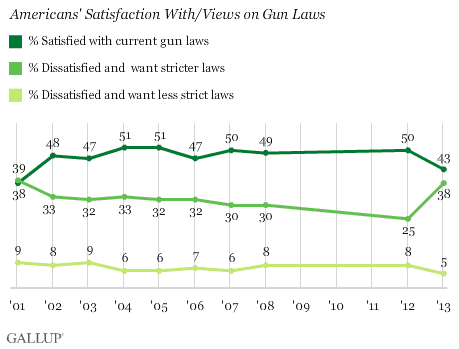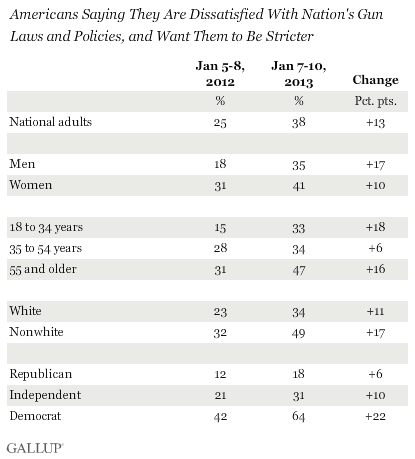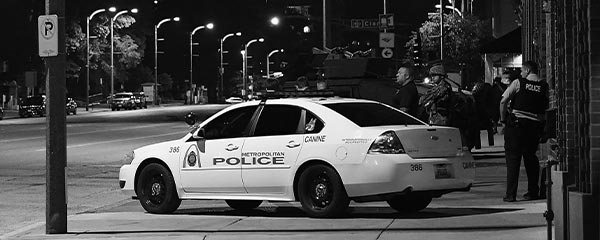PRINCETON, NJ -- In the aftermath of the Newtown, Conn., school shootings, and as Vice President Joe Biden leads a federal task force that will recommend ways to curb gun violence in the U.S., 38% of Americans are dissatisfied with the nation's gun laws and want them strengthened. This is up from 25% who held this set of views a year ago, and is the highest since 2001. Still, more Americans are either satisfied with current gun laws, 43%, or think they should be loosened, 5%.

These findings are based on two questions in Gallup's annual Mood of the Nation survey, conducted Jan. 7-10. The first asks respondents if they are satisfied or dissatisfied with the nation's laws or policies on guns. Those saying they are dissatisfied are asked a follow-up question to determine whether they think the laws should be made more strict, made less strict, or kept as they are. As a result, the 38% who are dissatisfied and want stricter gun laws indicates not only a preference for stricter gun laws but a certain amount of intensity of feeling on the subject.
The uptick in support for strengthening gun laws seen on this question is consistent with a December Gallup poll conducted after the Newtown shootings that found a similar shift over the past year, using a question that does not measure intensity of opinion. That question, Gallup's long-term-trend measure of gun law preferences, found 58% of all Americans saying gun laws should be stricter, up sharply from 43% in 2011.
Men, Nonwhites, and Democrats Shift Toward Strengthening Gun Laws
Most subgroups are at least slightly more likely this year than last year to say they are dissatisfied with gun laws and want them to be stricter. However, this shift is more pronounced in some groups than others, namely men, nonwhites, and Democrats. Additionally, adults younger than 35 and older than 54 are more likely than middle-aged adults to express an increased desire for stricter gun laws.

As a result of these shifts, the gender gap in views toward gun restrictions has narrowed, while the already-large partisan gap between Republicans and Democrats has widened. Now 64% of Democrats vs. 18% of Republicans are dissatisfied with current gun laws and want them to be stricter.
Bottom Line
After a decade of little change in Americans' overall level of satisfaction with the nation's gun laws, significantly more now express dissatisfaction and want laws to be stricter. It's yet another sign that the tragic events at Sandy Hook Elementary School in Newtown, Conn., in December have given Americans pause on the issue, at least in the short term.
Other recent Gallup polling shows Americans are not prepared to relinquish their Second Amendment rights, as majorities reject banning the possession of handguns by civilians, or even outlawing the manufacture or possession of certain "semi-automatic guns known as assault rifles"; but they are clearly more open to further restricting the sale of guns, including with more background checks and bans on high-capacity magazines. Thus, Biden's task force enjoys a window of opportunity, albeit with apparent limits, to address Americans' concerns about gun violence.
Survey Methods
Results for this USA Today/Gallup poll are based on telephone interviews conducted Jan. 7-10, 2013, with a random sample of 1,011 adults, aged 18 and older, living in all 50 U.S. states and the District of Columbia.
For results based on the total sample of national adults, one can say with 95% confidence that the maximum margin of sampling error is ±4 percentage points.
Interviews are conducted with respondents on landline telephones and cellular phones, with interviews conducted in Spanish for respondents who are primarily Spanish-speaking. Each sample includes a minimum quota of 500 cellphone respondents and 500 landline respondents per 1,000 national adults, with additional minimum quotas among landline respondents by region. Landline telephone numbers are chosen at random among listed telephone numbers. Cellphone numbers are selected using random-digit-dial methods. Landline respondents are chosen at random within each household on the basis of which member had the most recent birthday.
Samples are weighted by gender, age, race, Hispanic ethnicity, education, region, adults in the household, population density, and phone status (cellphone only/landline only/both, cellphone mostly, and having an unlisted landline number). Demographic weighting targets are based on the March 2012 Current Population Survey figures for the aged 18 and older U.S. population. All reported margins of sampling error include the computed design effects for weighting.
In addition to sampling error, question wording and practical difficulties in conducting surveys can introduce error or bias into the findings of public opinion polls.
View methodology, full question results, and trend data.
For more details on Gallup's polling methodology, visit www.gallup.com.
